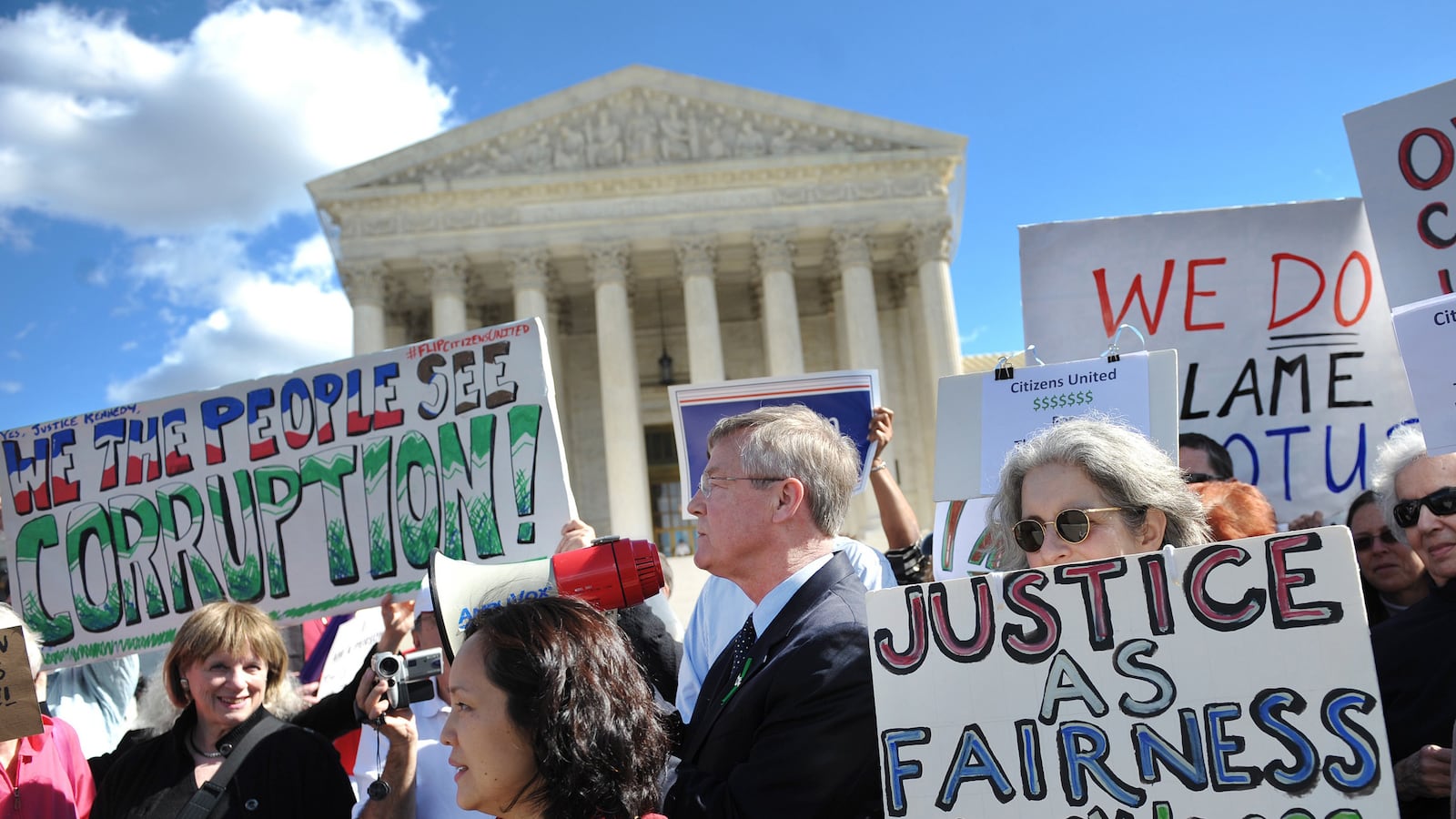If you think Citizens United was the problem in this election, you’re wrong. It’s worse than that.
My state, North Carolina, was supposed to be the silver lining in the dark midterm cloud, the place where organized people beat organized money. “Moral Mondays” activists have been mobilizing against a Tea Party legislature for two years, and they sent organizers into every county in the state. Sure enough, early voting figures showed Democratic voters turning out in much larger numbers than in 2010, and polls showed Democratic incumbent Kay Hagan ahead. Instead, before midnight last Tuesday, the race went to Thom Tillis, the president of North Carolina’s senate and the face of two years of laws restricting voting and abortion rights, blocking Medicaid expansion, and cutting back environmental protection. It was the most expensive Senate race in history, topping $113 million, of which more than $80 million came from outside groups.
Organized money swamped organized people (in fairness not all outside money was right-wing). Each vote cost more $16. That’s approaching the $20 price tag for literal vote-buying in West Virginia when I was growing up there, though some people said you could also get a vote for a pint of whiskey.
Everyone says this is how things were bound to go after Citizens United declared corporations people. That’s why there’s a movement to pass an amendment repealing corporate personhood. Citizens United has become the symbol of money’s power in politics.
Sadly, repealing corporations’ constitutional personhood wouldn’t help much, and even overturning Citizens United wholesale wouldn’t be nearly enough. The Supreme Court has been hollowing the idea that democracy is a constitutional value for almost 40 years, and the damage we need to undo goes much further than changing a single case.
In 1976, the Court ruled that wealthy individuals, candidates, and campaigns could spend as much as they liked on elections. Citizens United extended that logic to corporations and unions—a significant change but not a huge one.
It’s unsettling how much sense Citizens United and the earlier cases make from within First Amendment law. Money is the universal means: it lets you do just about anything. If you have a right to do something that’s otherwise legal, such as have an abortion, the government can’t do an end-run around that right by making it a crime to pay for an abortion. In a market economy, having a right generally means being able to pay to exercise it.
Speech is a right that has no natural limit. As long as you can pay for more, your speech gets bigger and bigger. Other rights—abortion, intimacy—are like your appetite for dinner: they’re contained by certain inherent limits. Even Second Amendment gun rights, though guns are notoriously for sale, will only let you shoot what you can hold in your hands, even if you buy a thousand firearms. Spending millions on speech is more like raising your own militia.
This wouldn’t so much matter if speech did not trench so closely on elections and political power. But the way that political spending gives some a very big speech right and leaves others a very small right greatly damages equal citizenship. It means that some are more equal—a lot more equal—than others.
And here’s the really wicked thing about the whole line of cases that led up to, and followed, Citizens United. They treat equal citizenship as having no constitutional value. They hold that political spending may not be limited to pursue equal influence in elections, or to avoid distortion of the political process by big spenders. The only motive that they allow for limiting political donations and spending is to prevent bribery, which the Court calls “corruption.” Every other kind of influence-buying, such as spending to achieve influence, gratitude, access, etc., is just fine. That’s not corruption, says the Court; it’s democracy.
In other words, the Supreme Court has defined democracy as a branch of capitalism, right up to the point of actual vote-buying. And actual vote-buying is a pretty low-rent form of corruption anyway. Those with real money and real power have always preferred (slightly) subtler methods, like spending $10 million to get a senator reelected, then politely requesting a meeting to explain your priorities—just to inform the senator’s judgment, of course!
Without a richer idea of democracy, equal citizenship doesn’t mean much: the Court has redefined it as the equal right of rich and poor to spend millions influencing politics. And if equal citizenship doesn’t mean anything, then it makes sense for the Court to go ahead and treat political spending just like other speech. After all, spending is a valuable expression of the right to advocate for your point of view. Only a countervailing principle like equal citizenship can stop it from expanding indefinitely—as it has been doing.
Here’s the hopeful thing. Anger about Citizens United has spurred a movement to amend the Constitution to reverse the opinion. The problem is that the most common move—taking away corporations’ constitutional rights—wouldn’t help much. Most of the money is coming from wealthy individuals. The corporations that can most easily make ideological donations, family enterprises like Koch Industries and Hobby Lobby, can also easily convert corporate money into personal money, then spend or donate it. Cutting off for-profit corporations’ political spending is reasonable and would help, but it wouldn’t reverse the current trend toward ever-more expensive elections.
So what the anti-Citizens United movement really needs to do is something even harder than amending the Constitution. It needs to voice and elevate an idea of democratic citizenship strong enough to block the growth of money in politics. It’s the idea that, past a point, citizens must be the same size. The one-person-one-vote principle—the one area where political equality means something in constitutional law—should tug free-speech doctrine away from its libertarian acceptance that some people have big speech, and other people’s speech is small.
Maybe it is also the idea that voters and, especially, their representatives, are supposed to adopt a civic perspective that involves some idea of a common good and some effort to show equal concern and respect for every member of the community—even if we totally disagree about exactly what that means. From this standpoint, excessive money in politics can turn representatives’ attention and loyalty away from these public-spirited questions to the narrower business of negotiating patronage. This kind of dependence on donors is a broader, older idea of “corruption” than bribery. Scholar-activists Larry Lessig and Zephyr Teachout have recently been working to revive it.
Both ideas are admirable, and quite possibly necessary to save American democracy from the auction block. But they face uphill struggles. The Supreme Court isn’t the only place where political cynicism lives. In a market economy that is increasingly a market society, it’s hard to see politics as something other than an alternative way of buying what you want. It’s hard to see political argument as anything other than salesmanship. And once you go down too far down that path, money isn’t just a legitimate mode of speech: it becomes the natural mode.
That’s where Citizens United is taking us, but it isn’t alone. We should try to stop, beginning by listening to the movements, like Free Speech for People, that want to restore a strong idea of democratic citizenship that isn’t just spending. Otherwise, we will get the democracy we pay for, which may turn out to be not much democracy at all.






